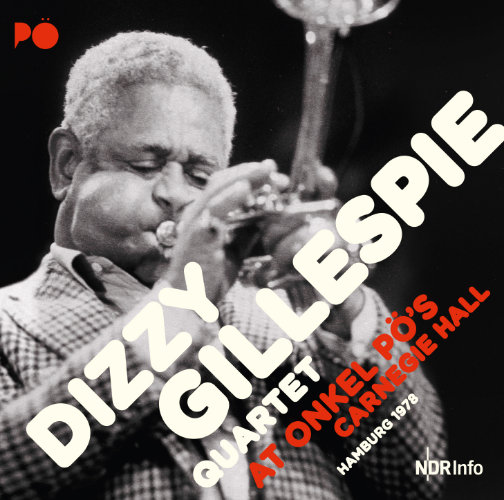Jazzline N 77037 (2CD) / N 78037 (3LP)
ALSO AVAILABLE IN VINYL 180g DIRECT METAL MASTERING
description

Vote Dizzy!
Considering the current developments on the market for Presidents of the United States one should probably remind the public, that even this strange bird - John Birks Gillespie from Cheraw, South Carolina, born in October 1917, nicknamed “Dizzy” since the start of his professional career and thus declared a bit crazy – once wanted to become President of the United States. Seriously? Most probably not. But back in 1964, the year after the assassination of John F. Kennedy in a country marked by traumatised resignation also in view of Lyndon B. Johnson, Kennedy’s deputy who had taken over the top job, there was a small-scale but inventive campaign: “Vote Dizzy!” These stickers are worth a small fortune today.
In March 1978, fourteen years on from this political super-joke, Dizzy’s quartet was back in Hamburg. Of course they also stopped by at “Onkel Pö”. By then the musician was 60 years old (“but I pass as 22!” he joked in the blues-phantasy just before the end of the concert) and had reached cult-status long before. The previous years he had toured from festival to festival together with the squad of impresario Norman Granz. On one of the recordings made at Montreux on the shore of Lake Geneva, the star trumpeter fought a “battle” with the upcoming star Jon Faddis, who was at least technically already his equal. Those were years in which the quirky master, who had initiated a be-bop-fashion trend with his small beard and beret in his early years, aimed at new goals and strategies. The quartet performing at “Onkel Pö” was exemplary for this new orientation.
Dizzy was on tour with a rather small team: the solos were divided between him and the only 22-year-old guitarist Rodney Jones, a brisk wanderer between different styles ever since, who was able already back then, to just pull John Lennon and Jimi Hendrix out of the hat (shortly before the end of the show); the equally youthful Ben Brown was the man on the electric bass. However, when it came to drummer Mickey Roker, Dizzy relied on his own, the bebop-tradition – Roker, born in Miami in 1932, who has made Philadelphia his home (still today!), guaranteed the band’s supply with rhythmical energy. In the second part of the “Pö”-concert Dizzy invited the saxophonist Leo Wright onto the stage. Wright, one of the style-defining Americans in Europe and in early post-war West-Germany, was born 1933 and died 1991 in Vienna. He was – together with Phil Woods - one of Charlie Parker’s legitimate heirs and since 1959 Dizzy’s permanent quintet-partner for two years. Wright, as a member of the SFB-big band, was firmly established in Europe’s American jazz scene in the Berlin of the 60s.
Brother Leo joined in during “Olinga”, a composition by pianist Mike Longo, with whom and whose songs Dizzy performed on a regular basis, often resulting in a cheerful chant together with the audience … generally, Dizzy enjoyed playing the clown, the unrestrained entertainer, in this phase of his career – playing the congas while constantly fooling about, not only with the ladies in the audience; already right at the start he made a slightly weird announcement when introducing the second track “The land of milk and honey”. As a professed adherent of the B‘ahai-religion, which has its origins in the Middle East, he talked Hebrew and pretended to be a Jew – Dizzy not only played the trumpet, he also played with us.
He was still one of the briskest in town, racing to the highest peaks from “lick” to “lick” and phrasing with his instrument raised to the sky, as it was his style since the mid-50s. His passion for “funky” rhythms had noticeably increased. Especially, when he suddenly called out “Dizzy’s Party” towards the end of these atmospheric two-hours. The jazz-community might have felt like being part of one of the great parties of (the preceding) James Brown or (the subsequent) Maceo Parker. Also for that sort of entertainment “Onkel Pö’s Carnegie Hall” was just the right spot; this Hamburg Mecca of live-music between jazz and rock. Once again the NDR broadcasting truck was parked close to the entrance of the boiling party arena that night in March 1978 – to record yet another highlight in the history of jazz.
Dizzy forever. John Birks Gillespie passed away at the age of 75 in 1993. One of the richest lives in jazz of the past century had come to an end. The only goal he did not achieve was becoming President of the United States.
Michael Laages

